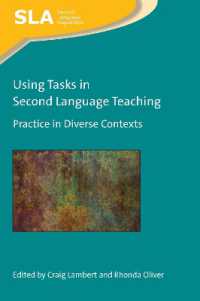- ホーム
- > 洋書
- > 英文書
- > Business / Economics
Full Description
Although just a decade ago, the destruction of a European state and society through war and genocide remains one of the worst global crises of the post Cold War era with reverberations still felt today. Bombardment and sieges of major towns and cities, concentration and death camps, and the mass slaughter and expulsion of civilians were all characteristics of a type of warfare that Europe had never dreamed might return. The war against Bosnia had a major impact on European and wider global consciousness, being as it was then, the most reported, debated and analyzed conflict to date. But despite the extensive coverage of Bosnia the author contends the conflict and its origins were certainly misunderstood, there being a significant gulf between media perspectives and the thrust of academic discourse. This multidisciplinary book is based on extensive research into the TV and newspaper framing of the war during the critical early period of its development. Uniquely the analysis of media is underpinned by an extensive and detailed historical argument about the nature of the wars and the politics of the Federation, including the use of media in war-making strategies in Yugoslavia itself. It will be of interest to scholars of IR and politics, media, communication and journalism studies, and war and genocide studies. Journalists and the general reader will find the book accessible with valuable insights into reporting war and understanding media representation of conflict. Key issues and questions addressed include: the critical use of official sources and propaganda in journalism; how media and policymakers interact to define and frame problems for policy action; what factors limit the accurate reporting of war, what is genocide and how is the Genocide Convention relevant in practice; and how to report genocide when such coverage conflicts with state interests.








